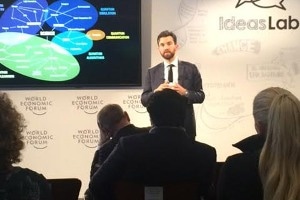Jan 20 2017
 Professor O'Brien speaking at last year's event (Credit: University of Bristol)
Professor O'Brien speaking at last year's event (Credit: University of Bristol)
Imagine in 2025 that quantum computers, while being quite expensive, are reliable, hugely powerful and able to circumvent strong encryption up to 256 bits. How should business, government and civil society prepare for such a future?
These are a few scenarios and questions that Professor Jeremy O'Brien, Director of the Centre for Quantum Photonics, the University of Bristol, recently planned to address at the annual meeting of the World Economic Forum (WEF) in Davos, Switzerland.
Part of the European Research Council (ERC) Ideas Lab delegation, Professor Jeremy O'Brien will be addressing political and industrial leaders from all over the world.
Over the past few years, Professor Jeremy O'Brien has been actively involved with the WEF and he recently became co-chair of the Global Future Council on Computing. In 2016, he delivered a speech on working towards a quantum computer analyzing the future of computing and how new areas of computer sciences are making room for the next digital revolution.
Quantum computing is capable of providing answers to a few of humanity’s most critical questions that current computing technologies have failed to answer.
In 2014, more than £270 million was invested by the UK government in the development of quantum technologies, guaranteeing that the UK becomes the epicenter of a technology revolution. Professor O'Brien has been heading the development of quantum computing using light in its quantum state, the photon, as the vital ingredient.
Within a decade, quantum computers will begin to outperform everyday computers, leading to potential breakthroughs in artificial intelligence, the discovery of new pharmaceuticals and beyond. The very fast computing power given by quantum computers has the potential to disrupt traditional businesses and challenge our cyber-security. Businesses need to be ready for a quantum future because it’s coming.
Professor Jeremy O'Brien
Quantum technologies provide sensors of unprecedented precision, ultra-secure communications and computers that are exponentially a lot more powerful than any supercomputer for a given task. These technologies are intended to basically change the lives of individuals, and the very first quantum devices that are commercially available are only now being showcased.
Professor O'Brien, holder of a prestigious Royal Academy of Engineering Chair in Quantum Engineering and an EPSRC RISE leader, has a 10 year plan that involves engineering new quantum technologies that will certainly disrupt the currently existing ICT models, thus making room for valuable new markets and new businesses.
He is currently creating ways that will help bring quantum computing into reality and that will also enable the market to transform artificial intelligence, cyber security, finance, energy, healthcare and the internet. Professor O'Brien is focusing on manufacturing a universal quantum computer in a silicon fab by using a photonic approach. He also aims at exploiting silicon photonics produced for optical interconnects in the semiconductor industry.
The World Economic Forum (WEF) Annual Meeting of business and political leaders is taking place from this week in Davos, Switzerland.